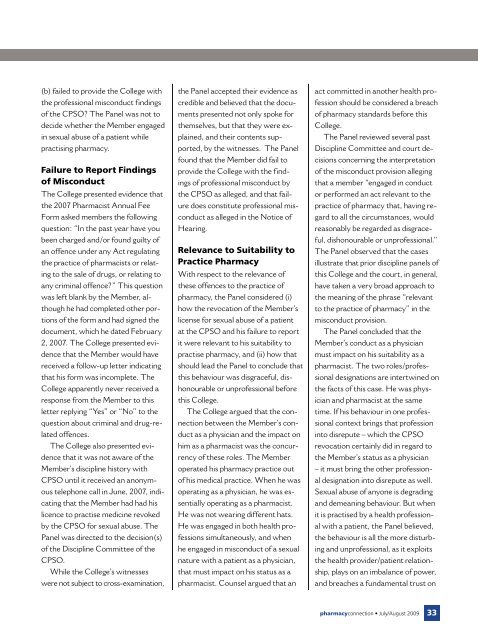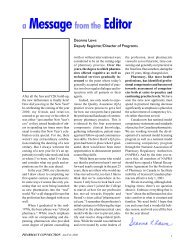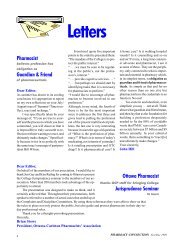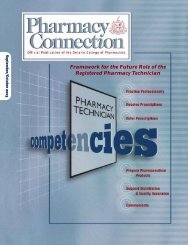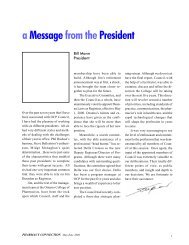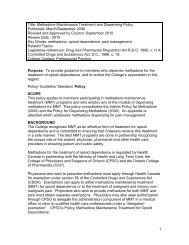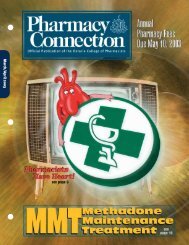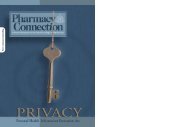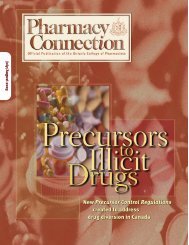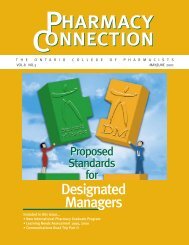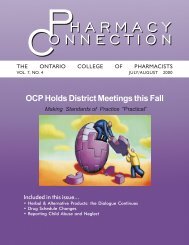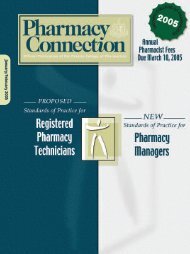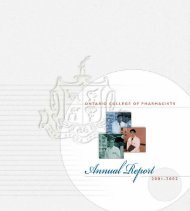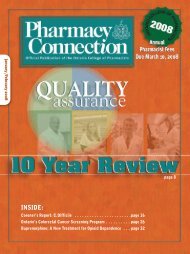Understand the Culture in Which You Practise Hyperthermia: Are ...
Understand the Culture in Which You Practise Hyperthermia: Are ...
Understand the Culture in Which You Practise Hyperthermia: Are ...
You also want an ePaper? Increase the reach of your titles
YUMPU automatically turns print PDFs into web optimized ePapers that Google loves.
(b) failed to provide <strong>the</strong> College with<br />
<strong>the</strong> professional misconduct f<strong>in</strong>d<strong>in</strong>gs<br />
of <strong>the</strong> CPSO? The Panel was not to<br />
decide whe<strong>the</strong>r <strong>the</strong> Member engaged<br />
<strong>in</strong> sexual abuse of a patient while<br />
practis<strong>in</strong>g pharmacy.<br />
Failure to Report F<strong>in</strong>d<strong>in</strong>gs<br />
of Misconduct<br />
The College presented evidence that<br />
<strong>the</strong> 2007 Pharmacist Annual Fee<br />
Form asked members <strong>the</strong> follow<strong>in</strong>g<br />
question: “In <strong>the</strong> past year have you<br />
been charged and/or found guilty of<br />
an offence under any Act regulat<strong>in</strong>g<br />
<strong>the</strong> practice of pharmacists or relat<strong>in</strong>g<br />
to <strong>the</strong> sale of drugs, or relat<strong>in</strong>g to<br />
any crim<strong>in</strong>al offence?” This question<br />
was left blank by <strong>the</strong> Member, although<br />
he had completed o<strong>the</strong>r portions<br />
of <strong>the</strong> form and had signed <strong>the</strong><br />
document, which he dated February<br />
2, 2007. The College presented evidence<br />
that <strong>the</strong> Member would have<br />
received a follow-up letter <strong>in</strong>dicat<strong>in</strong>g<br />
that his form was <strong>in</strong>complete. The<br />
College apparently never received a<br />
response from <strong>the</strong> Member to this<br />
letter reply<strong>in</strong>g “Yes” or “No” to <strong>the</strong><br />
question about crim<strong>in</strong>al and drug-related<br />
offences.<br />
The College also presented evidence<br />
that it was not aware of <strong>the</strong><br />
Member’s discipl<strong>in</strong>e history with<br />
CPSO until it received an anonymous<br />
telephone call <strong>in</strong> June, 2007, <strong>in</strong>dicat<strong>in</strong>g<br />
that <strong>the</strong> Member had had his<br />
licence to practise medic<strong>in</strong>e revoked<br />
by <strong>the</strong> CPSO for sexual abuse. The<br />
Panel was directed to <strong>the</strong> decision(s)<br />
of <strong>the</strong> Discipl<strong>in</strong>e Committee of <strong>the</strong><br />
CPSO.<br />
While <strong>the</strong> College’s witnesses<br />
were not subject to cross-exam<strong>in</strong>ation,<br />
<strong>the</strong> Panel accepted <strong>the</strong>ir evidence as<br />
credible and believed that <strong>the</strong> documents<br />
presented not only spoke for<br />
<strong>the</strong>mselves, but that <strong>the</strong>y were expla<strong>in</strong>ed,<br />
and <strong>the</strong>ir contents supported,<br />
by <strong>the</strong> witnesses. The Panel<br />
found that <strong>the</strong> Member did fail to<br />
provide <strong>the</strong> College with <strong>the</strong> f<strong>in</strong>d<strong>in</strong>gs<br />
of professional misconduct by<br />
<strong>the</strong> CPSO as alleged, and that failure<br />
does constitute professional misconduct<br />
as alleged <strong>in</strong> <strong>the</strong> Notice of<br />
Hear<strong>in</strong>g.<br />
Relevance to Suitability to<br />
Practice Pharmacy<br />
With respect to <strong>the</strong> relevance of<br />
<strong>the</strong>se offences to <strong>the</strong> practice of<br />
pharmacy, <strong>the</strong> Panel considered (i)<br />
how <strong>the</strong> revocation of <strong>the</strong> Member’s<br />
license for sexual abuse of a patient<br />
at <strong>the</strong> CPSO and his failure to report<br />
it were relevant to his suitability to<br />
practise pharmacy, and (ii) how that<br />
should lead <strong>the</strong> Panel to conclude that<br />
this behaviour was disgraceful, dishonourable<br />
or unprofessional before<br />
this College.<br />
The College argued that <strong>the</strong> connection<br />
between <strong>the</strong> Member’s conduct<br />
as a physician and <strong>the</strong> impact on<br />
him as a pharmacist was <strong>the</strong> concurrency<br />
of <strong>the</strong>se roles. The Member<br />
operated his pharmacy practice out<br />
of his medical practice. When he was<br />
operat<strong>in</strong>g as a physician, he was essentially<br />
operat<strong>in</strong>g as a pharmacist.<br />
He was not wear<strong>in</strong>g different hats.<br />
He was engaged <strong>in</strong> both health professions<br />
simultaneously, and when<br />
he engaged <strong>in</strong> misconduct of a sexual<br />
nature with a patient as a physician,<br />
that must impact on his status as a<br />
pharmacist. Counsel argued that an<br />
act committed <strong>in</strong> ano<strong>the</strong>r health profession<br />
should be considered a breach<br />
of pharmacy standards before this<br />
College.<br />
The Panel reviewed several past<br />
Discipl<strong>in</strong>e Committee and court decisions<br />
concern<strong>in</strong>g <strong>the</strong> <strong>in</strong>terpretation<br />
of <strong>the</strong> misconduct provision alleg<strong>in</strong>g<br />
that a member “engaged <strong>in</strong> conduct<br />
or performed an act relevant to <strong>the</strong><br />
practice of pharmacy that, hav<strong>in</strong>g regard<br />
to all <strong>the</strong> circumstances, would<br />
reasonably be regarded as disgraceful,<br />
dishonourable or unprofessional.”<br />
The Panel observed that <strong>the</strong> cases<br />
illustrate that prior discipl<strong>in</strong>e panels of<br />
this College and <strong>the</strong> court, <strong>in</strong> general,<br />
have taken a very broad approach to<br />
<strong>the</strong> mean<strong>in</strong>g of <strong>the</strong> phrase “relevant<br />
to <strong>the</strong> practice of pharmacy” <strong>in</strong> <strong>the</strong><br />
misconduct provision.<br />
The Panel concluded that <strong>the</strong><br />
Member’s conduct as a physician<br />
must impact on his suitability as a<br />
pharmacist. The two roles/professional<br />
designations are <strong>in</strong>tertw<strong>in</strong>ed on<br />
<strong>the</strong> facts of this case. He was physician<br />
and pharmacist at <strong>the</strong> same<br />
time. If his behaviour <strong>in</strong> one professional<br />
context br<strong>in</strong>gs that profession<br />
<strong>in</strong>to disrepute – which <strong>the</strong> CPSO<br />
revocation certa<strong>in</strong>ly did <strong>in</strong> regard to<br />
<strong>the</strong> Member’s status as a physician<br />
– it must br<strong>in</strong>g <strong>the</strong> o<strong>the</strong>r professional<br />
designation <strong>in</strong>to disrepute as well.<br />
Sexual abuse of anyone is degrad<strong>in</strong>g<br />
and demean<strong>in</strong>g behaviour. But when<br />
it is practised by a health professional<br />
with a patient, <strong>the</strong> Panel believed,<br />
<strong>the</strong> behaviour is all <strong>the</strong> more disturb<strong>in</strong>g<br />
and unprofessional, as it exploits<br />
<strong>the</strong> health provider/patient relationship,<br />
plays on an imbalance of power,<br />
and breaches a fundamental trust on<br />
pharmacyconnection • July/August 2009<br />
33


